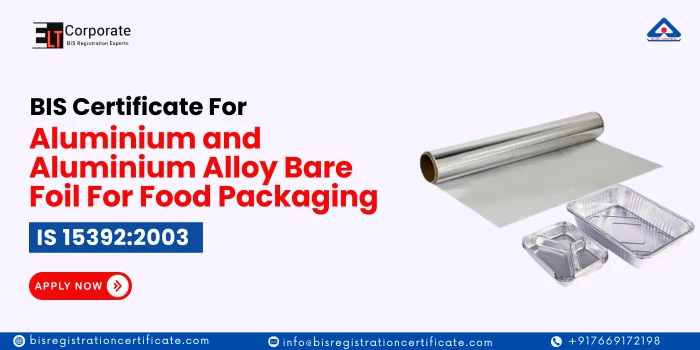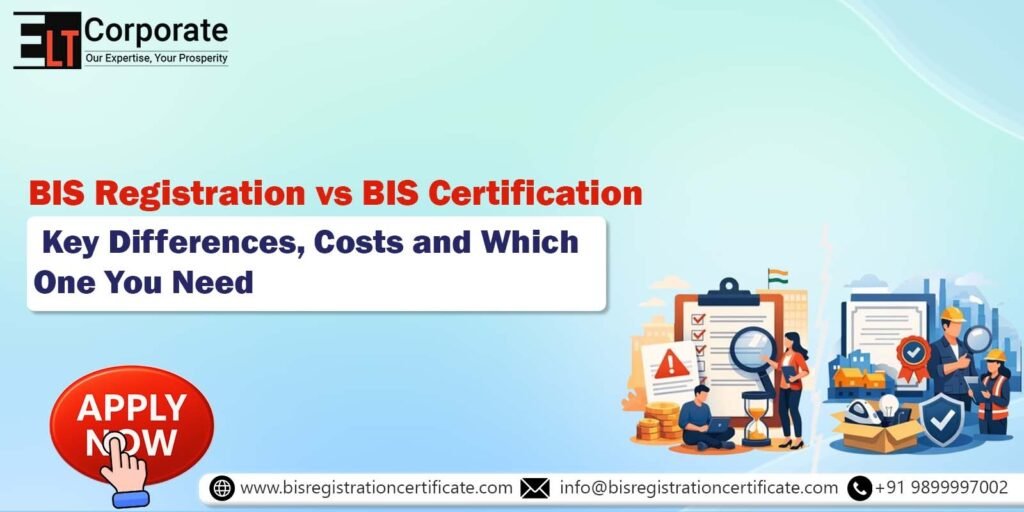Whether wrapping food for storage or using aluminium foil for other household purposes, its quality and safety are essential. Aluminium foil is widely relied upon for its durability, flexibility, and convenience in everyday use.
However, to ensure that these products meet stringent safety and quality standards, the Bureau of Indian Standards (BIS) mandates ISI certification for Aluminium Foil. The BIS ISI certification for aluminium foil adheres to Indian Standard IS 15392, ensuring compliance with safety and quality benchmarks.
While aluminium foil is a key focus, other commonly used products, such as pressure cookers, water heaters, and geysers, require ISI certification. This article explores the process and importance of obtaining a BIS certificate for Aluminium Foil, offering manufacturers a clear pathway to compliance and consumer confidence.
What Is A BIS Certificate For Aluminium Foils?
A BIS ISI certificate ensures that a product meets the quality and safety standards of Indian Standards. Issued by the Bureau of Indian Standards, operating under the Ministry of Consumer Affairs, it assures customers of product reliability and compliance.
Established in 1986, BIS provides ISI certification, product testing, hallmarking, and calibration services. The ISI mark signifies superior quality and performance, distinguishing certified products.
While obtaining ISI certification for aluminium foils is compulsory, it is voluntary for most products, such as pressure cookers, water heaters, and cables. Aluminium foil certification is governed by Indian Standard IS 15392, which ensures safety and quality.
Key Requirements For BIS ISI Certificate For Aluminium and Aluminium Alloy Bare Foil For Food Packaging
Several documents are required to obtain BIS certificate for aluminium foil, such as a copy of the partnership deed or MOA, GST registration, and MSME certificate. Also needed are the office and factory address details, premises documents, rental agreements, and a list of machinery used in production.
Additionally, the product packaging must display the following details:
- Manufacturing Date: The date when the foil was produced.
- Batch Number: A unique identifier for each batch of aluminium foil.
- Grade: The quality level of the aluminium foil.
- Manufacturing Name: The name of the company producing the foil.
Conditions For BIS ISI Certification For Aluminium Foil
Indian Standard governs BIS certificate for aluminium foil IS 15392. In a directive issued on 13th February 2020, the Ministry of Commerce and Industry made it mandatory for aluminium foil sold in India (not for export) to obtain BIS ISI certification. This order established key conditions for the certification process, which are as follows:
- Aluminium foil intended for sale in India must comply with IS 15392 and be certified by the Bureau of Indian Standards (BIS) under Scheme I of Schedule II.
- BIS is responsible for certifying and enforcing the ISI certification for aluminium foil.
As aluminium foil is commonly used in kitchens to wrap and protect food, poor-quality foil can pose health risks to consumers. To ensure safety and quality, the BIS mandates that aluminium foil meet Indian standards and obtain BIS ISI certification. This is essential to protect consumers from substandard products, as outlined in the Aluminium Foil (QC) 2020 Order.
Quality Tests Before Obtaining BIS Certificate For Aluminium Foil
Before an aluminium foil can be granted BIS ISI certification, it must undergo a series of quality tests to ensure its compliance with safety, reliability, and performance standards. These tests are conducted by BIS to guarantee the product meets the required quality benchmarks. The key tests include:
- Material Test
- Pinhole Count Test
- Lubricant Test
- Dimension Test
- Tensile Property Test
- Defects Test
- Surface Condition Test
These tests ensure that the aluminium foil meets the necessary standards for quality and safety before being certified with BIS ISI.
Benefits Of Obtaining BIS Certification For Aluminium Foil [IS 15392: 2003]
BIS certificate for aluminium foil offers numerous benefits listed below:
- Consumer Safety: Ensures that aluminium foil is free from harmful substances, safeguarding consumer health.
- Compliance with Standards: Demonstrates adherence to IS 15392: 2003, meeting India’s mandatory quality and safety requirements for aluminium foil.
- Market Trust: obtaining BIS certification also enhances consumer confidence by showcasing a reliable and certified product.
- Competitive Edge: Distinguishes your product from uncertified competitors, increasing its market appeal.
- Legal Compliance: Reduces the risk of regulatory penalties or legal disputes by meeting government-mandated certification requirements.
- Quality Assurance: Guarantees consistent product quality, fostering long-term customer loyalty.
Therefore, obtaining BIS ISI certificate for Aluminium foil as per IS 15392: 2003 will eventually provide you with multiple benefits for your business.
Documents Required For Obtaining ISI Certification For Aluminium Foil (IS 15392:2003)
To obtain BIS certificate for aluminium foil, the following documents are required:
- Company Registration Certificate
- Property Tax Receipt
- Company Insurance Policy
- Rent Agreement (if operating from a rented property)
- Phone and Electricity Bills
- Bank Statement
- Identity Proof (e.g., Voter ID, Driving License)
- Complete List of Manufacturing Machines
- Calibration Certificate for Testing Equipment
- Test Report
We at ELT Corporate, a trusted BIS Certification Consultant, offer comprehensive support to ensure a smooth and hassle-free documentation process for obtaining BIS certification for aluminium foil.
Procedure To Obtain BIS Certification For Aluminium Foil
The process for obtaining BIS certificate for aluminium foil involves the following steps:
- Selection of Product Code: Identify the relevant ISI standard code for aluminium foil, which is IS 15392, as per BIS guidelines.
- Application Submission: Fill out the application form and submit it with all required documents and fees for certification and factory assessment.
- Factory Assessment: After submission, an inspection team visits the factory premises to assess compliance with quality and standards. A product sample is collected and sent to a BIS-approved laboratory for testing.
- Product Testing: The product undergoes rigorous testing at the laboratory. Once the testing is complete, the manufacturer collects the test report and submits it to BIS.
- Review and Certification: BIS reviews the test report and verifies compliance with Indian Standard IS 15392. Upon meeting all requirements, the manufacturer is granted BIS ISI certification.
By obtaining BIS ISI certification under IS 15392, manufacturers can ensure that their aluminium foil meets the highest quality and safety standards.
Is BIS Applicable For Aluminium Foil?
Yes, obtaining a BIS certificate for aluminum and aluminum bare foil used in food packaging is mandatory as per BIS regulations to ensure the product’s quality and safety.
What Is The Relevant Indian Standard For Aluminium Foil For Food Packaging In India?
The relevant Indian Standard for aluminum foil for food packaging is IS 15392: 2020. This standard specifies the requirements for aluminum and aluminum alloy bare foil used in packaging applications to ensure safety and quality.









